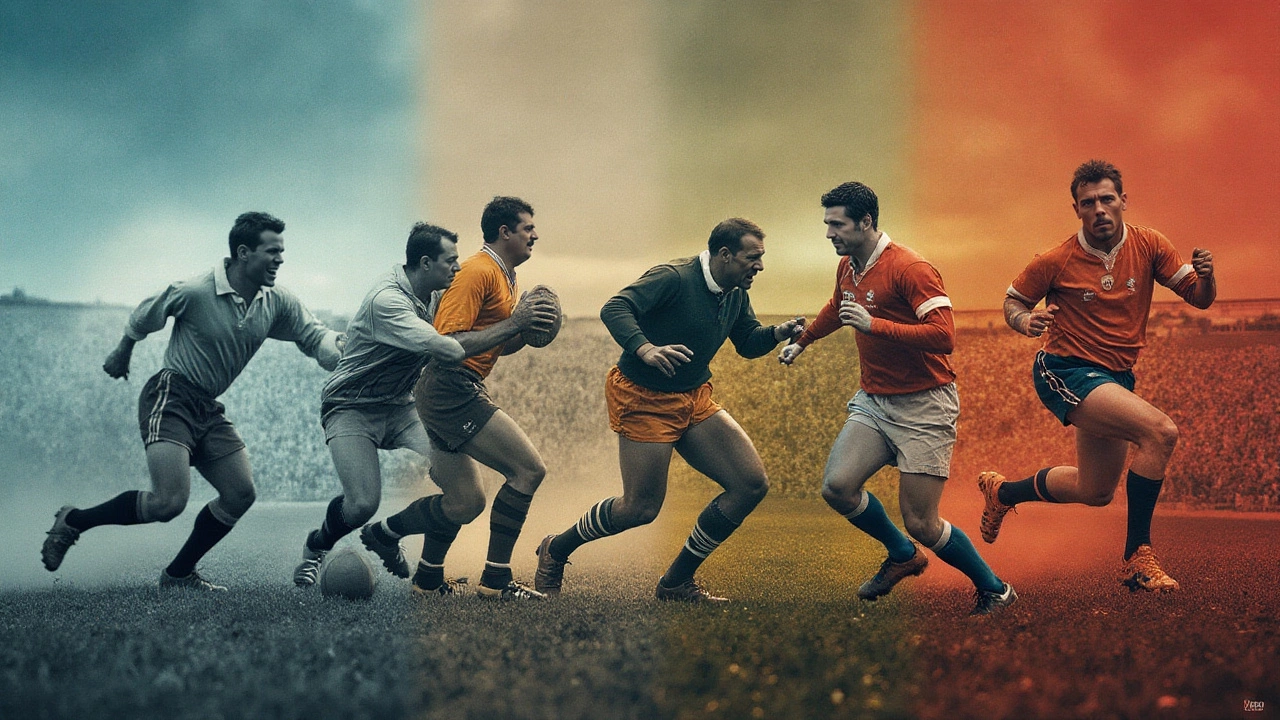
In many parts of the world, rugby is more than just a game. It’s a community, a tradition, and an expression of national pride. The way people play it, watch it, and celebrate it says a lot about their country's culture and history.
Some countries are simply crazy about rugby, and their national teams are famous for their skill and sportsmanship. These places have deep-seated rugby traditions that have shaped their national identities for generations. As you explore rugby's global hotspots, you'll find diverse stories and passions that underscore why this sport is so beloved.
- The Rugby Giants: New Zealand
- Rugby’s European Heart: England
- South Africa: A Story of Unity
- Australian Passion on the Field
- Rugby in France: Tradition Meets Modernity
- Emerging Rugby Nations
The Rugby Giants: New Zealand
When you think of rugby, New Zealand often springs to mind. It's not just because of the legendary All Blacks, though they do play a massive role in the country's passion for the sport. Rugby is woven into the fabric of daily life here, uniting people from all walks of life in a shared love for the game. From Auckland to Wellington, rugby fields are as common as the local dairy, and weekends are often marked by the roar of crowds and the thud of feet on grass.
New Zealand's journey to becoming a rugby powerhouse is a fascinating tale. The sport was first introduced by British settlers in the 19th century, but it quickly took on a life of its own, becoming a cornerstone of Kiwi culture. The All Blacks, with their distinctive black jerseys and unforgettable haka, have become icons of excellence and sportsmanship. Over the years, they have won numerous Rugby World Cups, their skills and strategies setting the bar sky-high for teams around the world.
The late Jonah Lomu, an All Blacks great, once said, "Rugby is not just a sport in New Zealand, it's part of the culture, part of who we are." His words echo the sentiment felt by many Kiwis, who see rugby as much more than just a game.
Junior leagues are a testament to the enthusiasm for rugby in New Zealand. Kids from a young age are encouraged to try their hand at rugby, and schools boast impressive teams that nurture talent early on. Community support is unwavering, with parents and locals turning out in droves to support emerging players, hand in hand with the professional tiers that train in state-of-the-art facilities.
As the chilly winds sweep across New Zealand's lush landscapes, rugby fever continues to grip the nation. Even in the most remote communities, rugby is a beacon of connection, instilling values of teamwork and perseverance. Whether it's a neighborly chat about last night's game or the shared excitement of watching the All Blacks face off against global rivals, rugby's influence permeates every aspect of life.
For New Zealanders, rugby is both a cherished pastime and a symbol of national identity. It's no wonder that when the All Blacks perform the haka before a match, their fierce display is met with a pride that resonates far beyond the stadium. As they continue to dominate on the world stage, their legacy inspires not just future generations of Kiwis, but rugby enthusiasts around the globe.
Rugby’s European Heart: England
Few places in the world can boast the rich rugby heritage of England. Here, rugby is intertwined with the nation’s identity, offering a sense of history, pride, and community that stretches back generations. The origins of rugby can be traced to the English town of Rugby, where the game as we know it today first took shape in the 19th century. Known for its robust and tactical style, English rugby has influenced the sport across the globe.
England's passion for rugby is evident in its numerous clubs and schools that foster new talent from a young age. Considered a sanctuary for the sport, Twickenham Stadium, located in London, is often filled with raucous fans, especially during the Six Nations Championship. The championship is one of the most important events on the rugby calendar, attracting viewers not just from England but internationally. During these matches, you can feel a palpable energy and excitement in the air, indicative of England’s deep love for rugby.
English rugby has been marked by unforgettable moments and legendary players. One such player, Jonny Wilkinson, is often celebrated for his match-winning drop goal that secured England's victory in the 2003 Rugby World Cup. This historic victory was a moment of sheer joy and pride for the nation. Such heroes are not just admired on the field but serve as role models, inspiring the next generation of rugby players to carry forward the torch of excellence.
England is also known for its fierce rivalries, particularly the one with France. These matches, dubbed as the “Le Crunch,” are charged with intensity and passion, making them thrilling spectacles that keep fans on the edge of their seats. The rivalry adds another layer to the sport’s rich tradition in the nation, highlighting how rugby can ignite national fervor and friendly competition.
"Rugby is a way of life in England, not just a sport. It's about teamwork, resilience, and a deep sense of respect for the opponents," commented Martin Johnson, former England rugby captain.
As rugby continues to evolve, England maintains its position as a major player on the international stage. With a dedicated following and a strong grassroots program, the future looks bright for English rugby. The country remains committed to nurturing talent while celebrating the cultural significance of rugby in its social and national context. It's no stretch to say that in England, rugby is not just played — it is celebrated as an art form.

South Africa: A Story of Unity
South Africa's love affair with rugby tells a story beyond the sport itself. It narrates a tale of overcoming division and embracing unity. For many, the journey starts in 1995 when the Rugby World Cup was held in South Africa. Against all odds, the Springboks triumphed, defeating the All Blacks in a thrilling final. This event was monumental not just for the win, but for its symbolism. Nelson Mandela, the country's first black president, famously donned the captain's jersey, forging an image that resonated across the globe. This gesture, while simple, carried a message of peace and reconciliation, encapsulating the spirit of a nation striving to heal from the scars of apartheid.
The Springboks' triumph at the 1995 World Cup marked a pivotal moment where rugby became a bridge, connecting diverse communities across South Africa. Rugby in South Africa, therefore, is not just a game. It encapsulates the dreams and hopes of a nation moving forward. Since that historic moment, rugby has flourished in the country, becoming an integral part of its cultural identity. Icons like Siya Kolisi today carry that legacy forward, exemplifying leadership both on the field and beyond. The sport is woven into the very fabric of South African society, from lush green fields in urban settings to sandy pitches in small towns, showcasing the scope and reach of rugby's influence across the country.
The influence of rugby extends to grassroots levels, where many young South Africans find aspiration and drive. Rugby clubs abound, offering communal benefits and fostering local talent with the dreams of making it to the national team. Such clubs play a significant role in developing the sport and nurturing young athletes, who might one day play alongside their idols. Touring the local clubs reveals the country's passion; not just in terms of competitive spirit but also in the communal and family bonds formed on and off the field. It's a place where camaraderie thrives, friendships are built, and unforgettable memories are made. Rugby in South Africa has managed to transcend boundaries, becoming a symbol of hope and a foundation for a unified national identity.
"Sports have the power to change the world," Nelson Mandela once said, "It has the power to inspire. It has the power to unite people in a way that little else does."
In recent years, South Africa has consistently been a powerhouse in international rugby. With achievements that include winning multiple World Cups, the national team continues to be a strong competitor on the world stage. The backing of loyal fans, who paint stadiums green and gold, cheering with unmatched fervor, adds to the team's success. The 2019 Rugby World Cup victory further cemented the Springboks’ position in rugby history, adding yet another glorious chapter to their story. Celebrated widely across the country, it was a victory that again echoed unity and triumph against all odds.
Australian Passion on the Field
Australia is known for its love of sports, and rugby holds a special place in the hearts of many Aussies. The country has a deep-rooted history with rugby that stretches back over 150 years, becoming an integral part of its culture. Matches are not just events but grand festivities where communities come together to celebrate and cheer for their team, from the green and gold-clad wallabies to local club heroes. Rugby in Australia offers a unique blend of physicality and skill, combined with an attacking flair that is a joy to watch. The Australian national team, affectionately known as the Wallabies, has established itself as one of the elite teams in the rugby world, consistently competing in and winning international tournaments. This sporting vigor has spurred the growth of the game at grassroots levels, with schools and clubs nurturing young talent who dream of donning the famous Wallabies jersey one day.
The annual Bledisloe Cup features some of the fiercest rugby rivalry contests between Australia and New Zealand. This fixture is more than just about trophies; it’s a battle where pride and honor on the field are at stake. Fans eagerly anticipate these matches, where every tackle, pass, and try can send the stadium into roaring applause. The club-level enthusiasm is equally palpable in Super Rugby clashes, showcasing exceptional talent from across the southern hemisphere. The Australia National Rugby Union has been active in promoting the sport among all age groups, emphasizing participation, enjoyment, and skill development over competitiveness. With a country as vast and diverse as Australia, rugby has managed to unite various communities by transcending regional and cultural differences. Enthusiasts in the outback as well as in bustling city suburbs share a common passion—it's the love of the game that fuels their excitement.
The legendary Australian captain, John Eales, once said, "Rugby teaches a young man to respect like no other game, to win with dignity, and to lose with grace without handing out excuses.”
Beyond the competitive arenas, rugby contributes significantly to the social fabric of Australian society. In rural areas, it enthralls communities, often served as a focal point for large gatherings where life-long friendships are forged. Rugby has become a powerful means of inspiring teamwork, discipline, and sportsmanship among young people. Participation rates in rugby union have showcased sustainable growth, with initiatives encouraging wider engagement and raising the profile of women's rugby. With the world watching, Australia continues to honor traditions while also innovating, ensuring rugby remains a dynamic and cherished part of life. Even mainstream media, which tends to dominate the narrative of cricket and Australian rules football, dedicates substantial airtime to celebrate the achievements and stories that emerge from the rugby field.

Rugby in France: Tradition Meets Modernity
Rugby in France is a unique tapestry where tradition intertwines beautifully with modernity. It's a sport deeply embedded in the French culture, with roots stretching back to the 19th century when British schools introduced it. Ever since, rugby has grown to become one of France's most cherished sports, epitomizing teamwork, respect, and passion. French clubs, like Toulouse and Clermont Auvergne, are known for their fierce competitiveness and have made a significant mark in European rugby, adding a distinct flair with their style of play.
The French national team, known affectionately as "Les Bleus," embodies this harmonious blend of past and present. They have a reputation for being unpredictable and thrilling, capable of defeating the best teams in the sport, a fact that makes every match an event full of anticipation. France's rugby philosophy encompasses an attacking style, with an emphasis on creativity and improvisation. This unique approach has often bewildered opponents and thrilled fans alike.
Over the years, France has produced some of the most iconic players the rugby world has seen. Legends like Serge Blanco, with his dynamic running ability, and Fabien Galthié, renowned for his strategic brilliance, have set high standards on the international stage. Not only do these players showcase extraordinary skill, but they also carry rugby's rich cultural heritage forward by inspiring younger generations. Popular rugby events like the Six Nations Championship bring together nations and highlight the sport's diversity and global appeal.
"The French play rugby as they cook: with imagination, commitment and love." — Nigel Owens, Rugby Referee
The modern era has seen the Top 14 league rise as one of the most competitive in the world. This premier competition features clubs from across France and attracts high-profile international players who add their unique skills to the league. Innovations in coaching and player development have transformed these clubs into powerhouses, both domestically and internationally. Yet, despite these changes, there's an undeniable charm about French club rugby, driven by passionate fan communities and an unyielding sense of local pride.
Looking at the statistics of rugby's popularity in France, it is clear that the sport continues to flourish. With over 450,000 registered players and rugby schools nurturing young talents, the future looks vibrant. France's commitment to hosting global events like the Rugby World Cup further cements its status as a leading rugby nation. Such events not only ignite local enthusiasm but also position France as a welcoming stage for rugby's grand spectacles.
In essence, rugby in France captures the heart of the nation. It demonstrates how tradition can evolve into a modern spectacle that continues to captivate the imagination of millions. From its humble beginnings to its present-day glories, rugby in France is a testament to the sport’s enduring legacy and its ability to adapt in today's fast-paced world.
Emerging Rugby Nations
Over the past few decades, the landscape of rugby has seen a fascinating shift. As dominant giants like New Zealand and England stroll through the field with ease, several up-and-coming countries are stepping into the spotlight, showcasing promising talent and genuine passion for the sport. These emerging rugby nations are not only expanding the sport’s horizons globally but are also fueling exciting and sometimes unpredictable matches. With each passing year, their presence in international tournaments becomes more evident, capturing the attention and admiration of rugby enthusiasts worldwide.
One such nation that has shown remarkable progress is Georgia. With a rich tradition of physical sports, this former Soviet republic has embraced rugby with fervor. The national team, known as the Lelos, has made notable appearances in World Cups, stunning traditional opponents with their strength and strategic gameplay. An emphasis on grassroots programs across the country has nurtured young talents and brought about a rapid rise in the sport's popularity. Since their debut in the 2015 Rugby World Cup, Georgia has become a force to be reckoned with, often defeating teams higher ranked than themselves.
Elsewhere, Japan has been another standout example of rugby's growing footprint. A country traditionally associated with baseball and sumo, Japan took the global stage by storm when it hosted the 2019 Rugby World Cup. Known for their speed and precision, the Japanese team, or the Brave Blossoms, delivered a breathtaking tournament. Their gutsy victory over South Africa in the 2015 World Cup, often dubbed as the Brighton Miracle, and a quarter-final appearance later on home soil, have solidified Japan's place as a future powerhouse.
"Their achievement has set a new standard for emerging rugby nations, inspiring hope and ambition," remarks Eddie Jones, the former Japan coach.
Uruguay is yet another contender making waves in the world of rugby. Known as the Teros, the team has steadily climbed the ranks, determined to carve out a respectable international presence. Their victory over Fiji in the 2019 World Cup was a testament to their hard work and strategic discipline. The win boosted rugby's profile in Uruguay, inspiring a new generation to take up the sport. Robust support from local institutions and increased exposure to international competitions has provided the Teros with valuable experience, propelling their game to new heights.
As these nations continue to invest in rugby, it is not merely about gaining recognition but also about cultivating a sport that fosters unity and discipline. Kenya, with a historical background in athletics, is also making a name in rugby, particularly within the sevens format. Their flair and determination in tournaments bring a fresh and electrifying energy to the game. As these emerging rugby nations progress, the global rugby community witnesses an expanded tapestry of strategies and styles, which only enriches the sport further. By nurturing talent and building strong domestic leagues, these countries are laying a strong foundation for sustainable progress and hinting at a future where rugby is embraced more universally and fervently.
